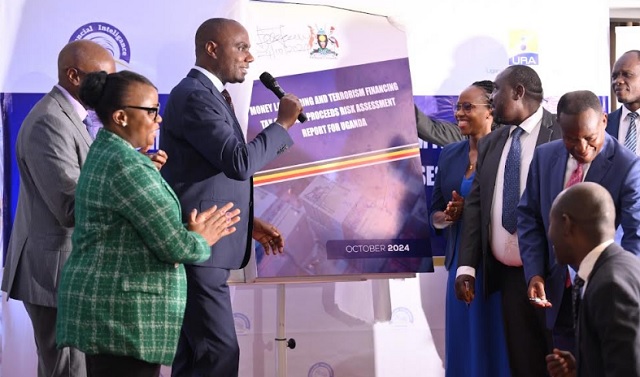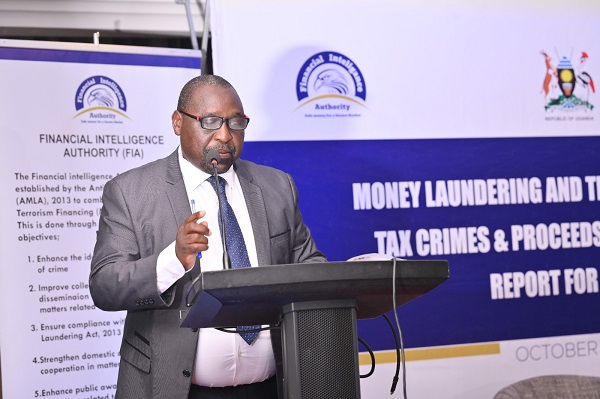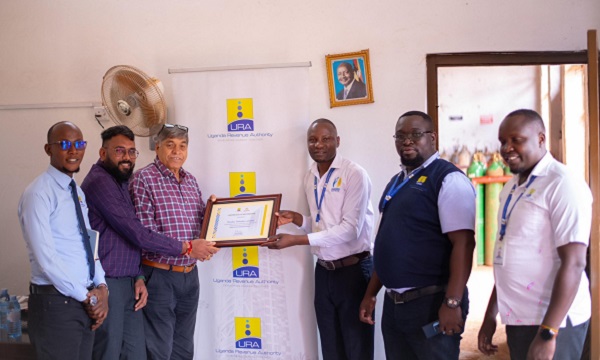
Looking to tough, new compliance, enforcement
COVER STORY | RONALD MUSOKE | Value Added Tax (VAT) fraud is the most prevalent tax crime in Uganda. This was one of the revelations at the launch of the “Tax Crimes and Proceeds Risk Assessment Report, 2024” in Kampala on Oct.24 by the Financial Intelligence Authority (FIA) – the country’s anti-money laundering and countering terrorism financing watchdog.
The report notes that Uganda has a small tax base. This is coupled with non-compliance by some taxpayers. This results in low tax collections. The fiscal deficit has, for instance, risen from 7.1% of GDP in 2019/20 to about 9% in 2020/21.
The report reviewed data from 2017-2022 on tax evasion schemes, enforcement, and offences including smuggling, obstruction, non-filing, under-filing, fraudulent schemes, inaccurate record keeping, falsehoods and other tax crimes that generate proceeds for money laundering and criminal enrichment.
It also considered suspicious transactions, investigations conducted, convictions obtained, assets seized/frozen, and mutual legal assistance requests received by Ugandan authorities from foreign jurisdictions.
In a foreword to the report, John Musinguzi Rujoki, the Commissioner General of Uganda Revenue Authority (URA) said success of domestic resource mobilisation efforts depends on ensuring that everyone pays a fair share of tax. He said Ugandans now know the close link between taxes paid and public services enjoyed in a form of fiscal-social contract. Rujoki said the tax authority is determined to redouble its efforts to stamp out tax crime.
Henry Musasizi, the Minister of State for Finance, Planning and Economic Development who was the Chief Guest at the report launch noted that several studies have shown that tax crimes/evasion and money laundering are widespread and costly to an economy. He said tax crimes and money laundering harm the government and society and put law-abiding citizens at a disadvantage.
Musasizi also noted that there is often an overlap between tax crimes/ evasion and money laundering. Both crimes are often concurrently committed and both crimes often rely upon similar techniques such as use of shell companies, fraudulent business records and accounting journal entries, among others.
In 2012, the Financial Action Task Force (FATF), the global anti-money laundering and combating terrorism financing watchdog, added tax evasion to its official index of offences “predicate” to money laundering.
Uganda has adopted a similar approach that places tax evasion in the same tier as arms trafficking, drug trafficking, corruption and other serious offences whose proceeds are commonly laundered by criminals. This increased the tools authorities could use to combat tax crimes.
Musasizi said there is an urgent need to pursue money laundering investigations alongside tax crime investigations to trace related proceeds, enforce recoveries and strengthen tax enforcement actions.
“Tax crimes and money laundering techniques are changing as criminals employ new technology tools, misuse of virtual assets and cross-border offences are becoming more widespread,” he said, “As cases become more complex, setting up joint taskforces and intelligence-sharing groups, both in the domestic and international arena, becomes increasingly important.”
“It’s also critical that Uganda stays up-to-date with technological developments that are leading to the emergency of new risks including the increase in cybercrimes, misuse of crypto currencies and a new breed of sophisticated professional enablers that create opaque structures and are increasingly moving money in real-time.”
The assessment was undertaken by a working group composed of officials from the Ministry of Finance, Planning and Economic Development, Uganda Revenue Authority, the Financial Intelligence Authority, the Uganda Police Force’s Criminal Investigations Directorate (CID), Uganda Registration Services Bureau (URSB), the Directorate of Citizenship & Immigration Control, Uganda Bankers Association and the Civil Society Budget Advocacy Group (CSBAG) with technical assistance from the World Bank.
The team analyzed the country’s tax threats, vulnerabilities and possible remedies. According to the report, the tax crimes threat remains high. Value Added Tax (VAT) fraud is the most prevalent tax crime in Uganda, according to Edward Amanyire, a Strategic Analyst at the Financial Intelligence Authority.
It involves false declarations and fictitious invoices. It is also as a result of informal cash transactions that are widespread in Uganda’s economy. After VAT fraud, other tax crimes include; Corporate Income Tax crime, Pay As You Earn (PAYE) or payroll tax), and personal income tax.
“The methods of tax evasion showed that over and under invoicing is common in the system,” said Amanyire. He said falsification of documents is often used to manipulate business revenue from countries of origin as well as profits to lower tax liability.
The major drivers of tax crime threats are trade-based money laundering schemes due to the porous borders that Uganda shares with its neighbours. The report also notes that proximity to countries prone to illegal traffic of precious stones and metals and other tradeable goods makes it easier for tax evaders and launderers to perform unlicensed and unrecorded cross-border trading.
According to the report, 230,379 tax crime cases were detected by the Uganda Revenue Authority during the period under review. However, only 979 criminal investigations were conducted and 379 prosecutions and convictions were effected. During the same period, Shs600.86bn was confiscated and Shs8bn was recovered through the mutual legal assistance (MLA) requests. Nine outgoing MLA requests were made.
Improving tax regime
The Uganda tax system requires natural and legal persons to provide information about their income and assets during the tax year. The report notes that this has been improving every other year. For example, there has been an increase in number of registered tax payers from 1,024,483 taxpayers in 2016/17 to 1,590,241 in 2019/20 which shows an improvement in the level of tax compliance. According to the assessment, the level of domestic tax evasion vulnerability is rated as “medium.”
But, the report notes, the performance of tax to GDP has stagnated at around 13% during the assessment period and is projected to slightly increase to 15% in the next three financial years. Significant deficiencies in the tax regime remain in enforcement and administration, false tax declarations, misleading financial records and non-declarations among others.
The major drivers of the country’s tax vulnerability are weaknesses in tax enforcement by the tax authority and administration of tax evasion penalties to enhance compliance and increase responsiveness.
There are also still gaps in dealing with transfer pricing issues, offshore tax schemes, trade-based money laundering, timely exchange of information with other government agencies and other measures to enhance identification of tax evasion schemes and concealment of proceeds to effectively combat tax crimes and related money laundering.

According to the assessment, the analysis of the money laundering threat originating from tax crimes is high. For instance, between 2017 and 2020, a total of 31,689 tax-related cases were investigated, 233 cases were prosecuted and 168 cases led to the conviction of 176 persons, while, about Shs255 billion (US$70.8 million) of evaded tax was recovered by the URA.
Trend of rising tax crimes
Catherine Kyokunda Donovan, the Commissioner Legal Department at the URA said the trends of money laundering have been significant and warned that they could worsen as Uganda becomes an oil producer and continues to export large amounts of gold.
“It is evident that we are getting into critical sectors like petroleum and gold which encourage investors to come and invest into our economy. However, this comes with significant financial risk at a global level for money laundering.” She said already, prosecutions of tax crimes have risen.
Agnes Nabwire Asobola, the Assistant Commissioner, Tax Investigations at URA told a panel during the report launch that URA needs to be empowered to seize the assets of tax evaders and money launderers. She said the inability to trace, identify and get proceeds of crime is a major challenge for URA.
“We all know that tax evasion is a predicate offence to money laundering and with that in mind we have not yet been able to bring to book those who are involved,” she said, “As long as we cannot touch the assets that have been generated out of these proceeds, we are still leaving the offenders armed and empowered to continue doing so.”
She said, with effect from next year (2025), URA will activate the automatic exchange of information with over 140 jurisdictions around the world, a move that will enable the agency to access some of the information regarding properties and money Ugandans are holding around the world.
Nabwire said URA has decided that such collaboration is the only way that will help the agency improve its revenue collections. “We are adopting and enhancing technology, data analysis and improving our ability to identify tax evasion efficiently,” she said.
Uganda’s 10-fold growth programme
The government’s new 10-fold programme under NDPIV seeks to expand the economy from the current US$52 billion to US$500 billion by 2040. This means URA will be at the centre of growing taxes to support government ambitions. This is especially critical as foreign support appears to be dwindling every passing year.
“This is a challenge to us as URA, so we are focusing on reviewing our tax compliance and enforcement strategies to enhance voluntary compliance,” Nabwire said. “We are also focusing on tax education and awareness. We notice the public is not well-informed about tax issues and because of that, URA has even enhanced the division that is managing tax education.”
Sharon Lesa Nyambe, the Head of Office, United Nations Office on Drugs and Crime (UNODC), in Uganda said tax crimes represent a critical challenge to Uganda’s economic stability and development aspirations.
She said tax crimes such as evasion, fraud, and other illegal financial practices undermine the country’s fiscal health. “Such activities deplete public resources, depriving the government of much needed revenue that could otherwise be invested in infrastructure, healthcare, and education—the very foundations of sustainable development.”
“The stakes are high (and) if left unchecked, tax crimes fuel inequality, weaken public trust in governance, and perpetuate economic instability.”
Nyambe said addressing these challenges is not just a matter of strengthening tax enforcement—it is central to safeguarding Uganda’s broader developmental goals. She also noted that tax crimes are closely linked to the broader issue of Illicit Financial Flows (IFFs) which involve a range of illegal financial movements, including tax evasion, trade mispricing, and the laundering of proceeds from illegal activities across borders.

Nyambe noted that if Uganda successfully reduces tax crimes domestically, it will have contributed to achieving global security and prosperity. She emphasized the importance of collaboration in this fight because of the interconnectedness of financial systems and the cross-border nature of tax crimes and IFFs. She said no institution can address these challenges in isolation.
“This is not just a matter of enforcement; it requires coordinated efforts from all sectors to create an environment of transparency, accountability, and good governance,” she said. “The Uganda Revenue Authority, the Financial Intelligence Authority, civil society, the private sector, and our international partners all have a vital role to play in ensuring that the recommendations of this report are translated into actionable steps,” she said.
Going forward, the report calls for “an urgent need to pursue money laundering investigations alongside tax crime investigations to trace related proceeds, enforce recoveries and strengthen tax enforcement actions.”
“The government should also consider enactment of a law to facilitate non-conviction-based asset forfeiture/confiscation, capacity building of all stakeholders, and encourage formalization of the economy to boost tax revenue, reduce tax evasion and associated money laundering crime.”
But, John Baptist Ssentuwa, who works in the Financial Crime Risk Compliance Department at Standard Chartered Bank noted that Ugandans generally struggle to understand and differentiate what tax evasion, tax avoidance or tax planning is.
Ssentuwa said, for tax crimes to be dealt with comprehensively, authorities must level the ground. “We all agree that we need to develop the economy but this can only happen by levelling the ground. If one part is compliant and another is not compliant, challenges arise with compliance. Ssentuwa said enforcement for all will enhance compliance.
Uganda’s economy will remain ‘liberal’
However, Moses Ogwapus, the Commissioner Financial services in the Ministry of Finance, Planning and Economic Development said the government’s stance on a liberal economy remains resolute.
“Sometimes, we, as government, are criticized that Uganda is too liberal when it comes to inflows and outflows of capital but also other aspects of economic management,” Ogwapus said, “I would like to say that the government intends to continue with its liberal stance because it has overwhelming evidence that it is bearing great fruits for the country.”
Ogwapus said having a liberal economy is not tantamount to having no regulation and enforcement. “I think our Anti-Money Laundering policy and the laws point to the fact that you can have a balance of a liberal capital account with regulation and enforcement of laws,” he said.
Samuel Were Wandera, the Executive Director of the Financial Intelligence Authority said the assessment marks a significant step in strengthening the government’s fight against tax crime and related money laundering and terrorism financing, both of which cause serious risks to Uganda’s economic stability and financial integrity. “Tax crimes generate illicit proceeds and evaders are constantly finding new and complex ways to conceal their gains,” he said.
“It’s important, therefore, that we fully understand the risks and vulnerabilities in our tax system so that we comprehensively act to address them. All these activities undermine our tax system and damage our economy.”
Wandera said FIA expects the assessment to help the government to develop better policies and new enforcement strategies that government agencies shall use to address the risks highlighted by the report.
“The findings should also guide the government’s risk-based approach to supervision ensuring that resources are allocated where they are most needed in line with international standards,” he said, “Ensuring that those who commit tax crimes face legal consequences sends a strong message that crime does not pay.”
“Holding offenders accountable ensures that Uganda remains compliant with the international frameworks such as the FATF recommendations, safeguarding our financial system and economy from exploitation.”
“Prosecution serves as a powerful deterrent discouraging potential offenders and reinforcing public trust in the tax system,” he said, adding that, “Prosecution is not just about recovering lost revenue but it is also about upholding justice and maintaining the integrity of Uganda’s tax system and protecting Uganda’s long-term developing goals.”
Wandera emphasized that robust prosecution will align Uganda to meet global standards on combating tax crimes and money laundering and strengthen our reputation in the global financial community.
On non-conviction forfeiture, Wandera explained that, globally, it has been identified that criminals have mechanisms of acquiring assets through criminal illicit financial flows
“As you know, these crimes are committed undercover and the current legal provisions are to the effect that you must prove that these funds are originating from a predicate offence,” he said. “But we see a lot of assets accumulation and so the conviction-based forfeiture system requires that you can prosecute crimes not necessarily from the predicate offences. If this system were followed, we would see a lot of criminal activities deterred,” he said.
Josephine Namatovu, the Assistant DPP and Head of the Anti-Corruption Department at the Office of the Directorate of Public Prosecutions (ODPP) described the non-conviction-based forfeiture system as a mechanism that enables the government recover crime proceeds in absence of a criminal trial and in absence of a conviction.
Namatovu said the “non-conviction-based forfeiture system” is no longer an option for countries. She said it is now a requirement under the FATF recommendation to have this type of system.
“The way it works is if I see a building on Kampala Road and I suspect it is likely to be a proceed of crime, then I will institute proceedings against that building. It will not be Uganda vs Person so but, it will be Uganda vs Property so comprising Plot A or B along Kampala Road.”
“So, whoever thinks or believes that they own that property and they have a legitimate claim, they acquired it properly; it becomes their burden to defend how they acquired it. It no longer goes to the burden of “beyond reasonable doubt; it now turns to the owner to explain.”
Namatovu said Uganda is indeed working on a Proceeds of Crime Bill which will soon be introduced in Parliament. “But many people seem to be scared of it,” she said.
 The Independent Uganda: You get the Truth we Pay the Price
The Independent Uganda: You get the Truth we Pay the Price



